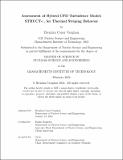Assessment of Hybrid CFD Turbulence Model, STRUCT-epsilon, for Thermal Striping Behavior
Author(s)
Vaughan, Brendan Conor
DownloadThesis PDF (4.101Mb)
Advisor
Baglietto, Emilio
Terms of use
Metadata
Show full item recordAbstract
Many advanced nuclear reactor designs are susceptible to thermal fatigue damage caused by thermal striping, which presently accepted modeling and design tools are unable to accurately or reliably predict the presence of. Advanced reactors are vital in achieving net-zero carbon electricity production and thus developing design tools that can predict thermal striping is essential. Any new design tool used in the nuclear industry must be validated against experimental data sets to ensure that results predicted by these methods are sufficiently accurate. The STRUCT-epsilon Computational Fluid Dynamics model was used to aid the development of a dedicated thermal striping experiment that will later be used to help validate the STRUCT-epsilon model's capabilities.
The STRUCT-epsilon model provided the ability to conduct turbulence resolving simulations at a speed conducive to rapid iteration of the design of the DESTROJER test facility. To further increase confidence in the STRUCT-epsilon model's applicability to the test cases, two LES runs were completed and demonstrate STRUCT-epsilon's ability to capture flow unsteadiness. However, in both test cases the STRUCT-epsilon model exaggerates the behavior seen in the LES runs; over predicting temperature oscillations in one case and the flow asymmetry in the other. The STRUCT-epsilon model's potential to predict asymmetric configurations provides promising further applications of the model. Future studies of STRUCT-epsilon should seek to better understand the model's performance in asymmetric flow cases to further support experimental design and the assessment of complex operating configurations.
Date issued
2024-02Department
Massachusetts Institute of Technology. Department of Nuclear Science and EngineeringPublisher
Massachusetts Institute of Technology